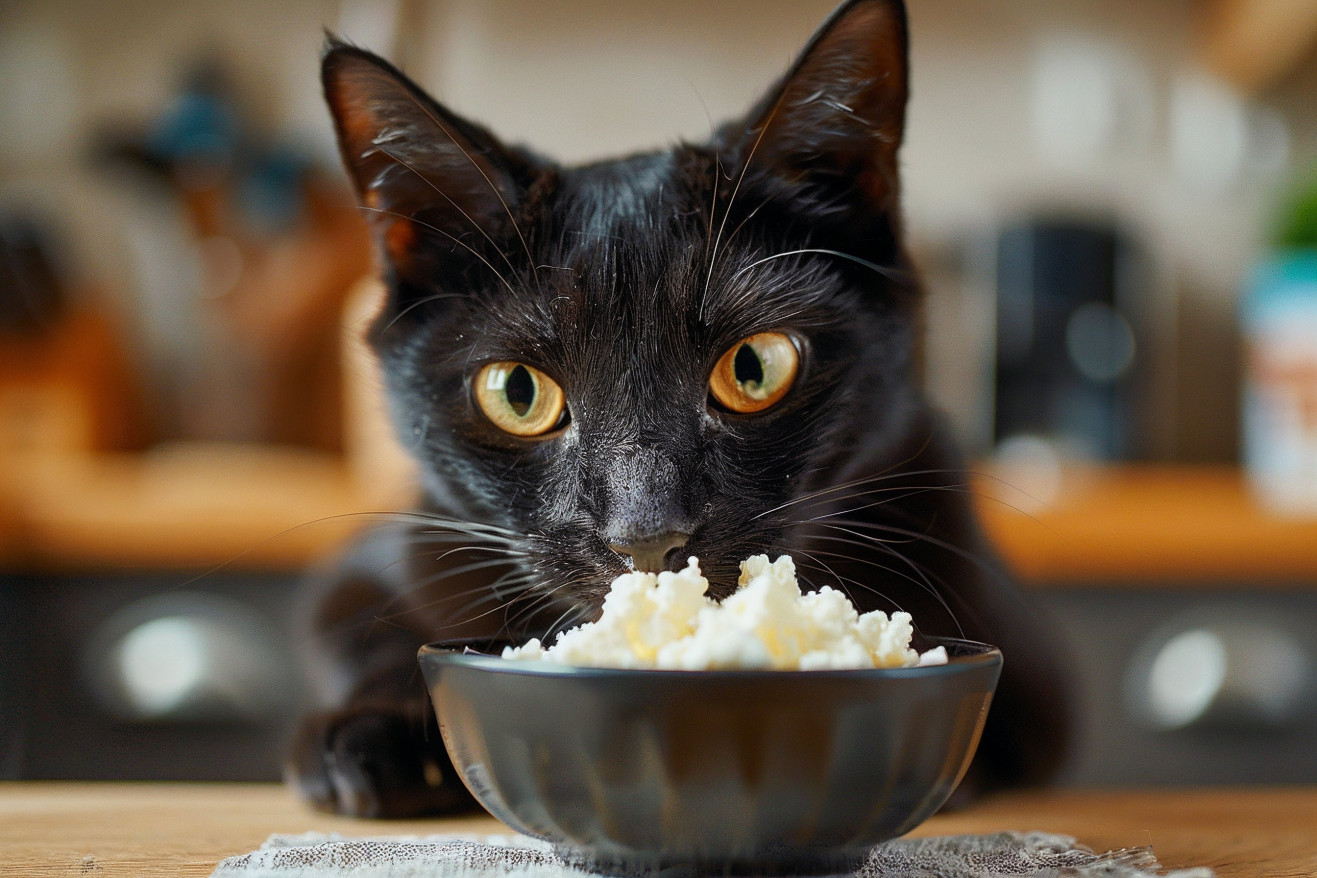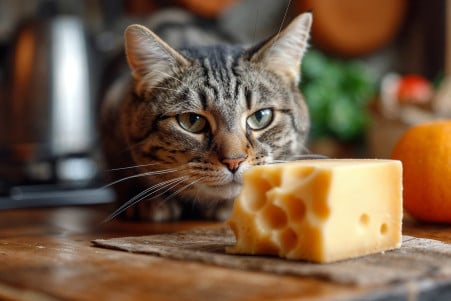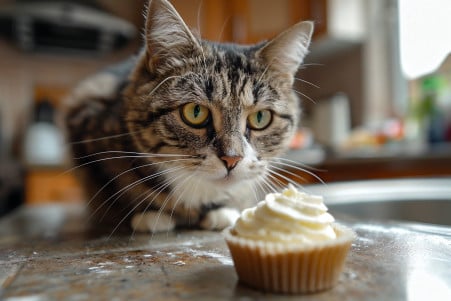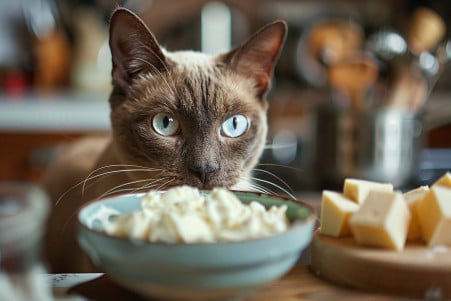Can Cats Eat Cottage Cheese? A Look at the Risks and Benefits
21 April 2024 • Updated 21 April 2024

Just how good is cottage cheese for cats, and what are the potential risks or benefits of giving your cat this dairy product? Cottage cheese can be a healthy source of protein for cats if fed in moderation. Although most cats are lactose intolerant, the probiotics in cottage cheese can help with digestion. On the other hand, cottage cheese is high in fat and calories, so it should only be fed as a treat and in small amounts.
By exploring the research provided by veterinary nutritionists and feline health websites, we'll compare the potential benefits of cottage cheese for cats to the risks of feeding it too often. This will help you better understand how you can use this popular cheese to improve your cat's diet in a safe and healthy way.
Can cats eat cottage cheese?
What Are the Potential Benefits of Cottage Cheese for Cats?
Cottage cheese has a number of nutritional properties that could make it a good occasional treat for your cat. For example, cottage cheese is a good source of protein, and protein is important for muscle growth and repair, especially in active cats. Cottage cheese also contains important minerals like calcium and phosphorus, which are important for bone health and general health.
For cats that are underweight and need to gain weight in a healthy way, cottage cheese can be a good way to help them put on pounds because it's high in protein and calories. The live bacterial cultures in cottage cheese can help with digestion and may have probiotic properties.
Cottage cheese is also a good source of vitamin B12, which is important for energy metabolism in cats. That said, it's important to remember that while cottage cheese has some nutritional benefits, cats should get most of their nutrition from a balanced, species-appropriate diet that's formulated to meet their specific needs. Cottage cheese should be an occasional treat and should be fed in moderation.
Risks and Concerns: Lactose Intolerance and Digestive Issues
Like many animals, cats are lactose intolerant, which means they can’t properly digest the lactose in dairy products like cottage cheese. Catster explains, this can lead to a number of gastrointestinal problems, including vomiting, diarrhea, gas, and abdominal pain. Cats with certain health issues, such as heart disease or obesity, may be more likely to experience negative side effects from eating cottage cheese.
Dairy allergies are another potential issue for cats, and they can cause skin problems, including itching, redness, and hair loss. PetMD points out that the most common food allergens for cats are beef, fish, and chicken, but dairy products like cottage cheese can also cause allergic reactions, although this is less common.
That said, it’s important to watch for signs of intolerance or allergic reactions when you first introduce cottage cheese into a cat’s diet. Vets Now warns that cottage cheese is high in lactose, which can cause diarrhea and stomach upsets in cats. However, if you introduce it slowly and watch your cat carefully, you may be able to determine whether your pet can tolerate it.
Portion Control and Moderation: How Much Cottage Cheese Is Safe for Cats?
Cottage cheese should be reserved for cats as a treat and not a regular part of their diet. According to ManyPets, portion sizes for cottage cheese treats can range from 1-2 teaspoons for cats and small dogs to as much as 1/2 cup for larger dogs. Overconsumption of cottage cheese can lead to weight gain, tummy troubles, and other issues.
Before giving cottage cheese to a cat, especially if they have dietary restrictions or health issues, it's always best to check with a vet. The blog at PetFoodMark recommends that cottage cheese be introduced to a cat's diet by mixing it in with their regular food to ensure that they're eating the right amount and to make sure that they don't have any negative reactions.
How to Feed Cottage Cheese to Cats
Cottage cheese should be introduced to your cat slowly and carefully. Per ManyPets, this means starting with a small amount, such as a teaspoon or less, and watching your cat for signs of intolerance or allergic reaction, such as vomiting, diarrhea, skin rashes, or increased thirst.
If your cat doesn't show any signs of intolerance or allergic reaction, you can increase the amount of cottage cheese you give them, but it should still be given in small amounts and as an occasional treat rather than a regular part of their diet. The blog at PetFoodMark recommends mixing cottage cheese in with your cat's regular food to help you control the portion size and watch for any signs of intolerance.
When you're shopping for cottage cheese, look for plain, unsalted, and low-fat options to avoid causing your cat any digestive upset. PetMD explains that while cats are less likely to be allergic to dairy than other foods, it can still happen and may cause skin rashes and other symptoms. Make sure to watch your cat closely for any signs of intolerance or allergic reaction.
Cottage Cheese to Help Underweight Cats Gain Weight
Because of its high protein and calorie content, cottage cheese can help underweight cats gain weight. Animal Gator explains that cottage cheese's protein can help cats build muscle and gain weight in a way that's healthy for them.
That said, it's important to talk to a vet before using cottage cheese to help your cat gain weight, as PetFoodMark's blog post points out. A vet can make sure that cottage cheese is added to a weight gain plan that's safe and tailored to your cat's specific needs and health concerns.
One way to do this is to add cottage cheese to your cat's regular food, or even use it as a topper, as suggested by CatKit Stories. This allows you to control the amount and see how your cat responds to it. It's important to do this in moderation, as feeding your cat too much cottage cheese can lead to digestive problems or even more weight gain than you want. It's important to watch your cat closely and take a gradual approach when adding cottage cheese to an underweight cat's diet.
Conclusion: How to Decide If Cottage Cheese Is Right for Your Cat
While cottage cheese can be a protein-packed, low-lactose treat for cats, it’s important to proceed with caution. Most cats are lactose intolerant, so eating cottage cheese can cause digestive problems like vomiting, diarrhea, and gas. Purina explains that cats’ inability to digest dairy is due to their evolution as obligate carnivores.
In addition, cats can develop allergies to dairy, which can cause skin problems and other issues. PetMD warns that cottage cheese, which is relatively high in lactose, is not recommended for cats. The Cummings Veterinary Medical Center at Tufts University warns that soft cheeses like cottage cheese can be dangerous for cats.
If you decide to feed your cat cottage cheese, it should be in small amounts and only as an occasional treat, not a regular part of their diet. Always check with your vet first, especially if your cat has any dietary restrictions or health issues. And always watch for signs of intolerance or allergies. In general, it’s best to be cautious and feed your cat dairy products in moderation.


